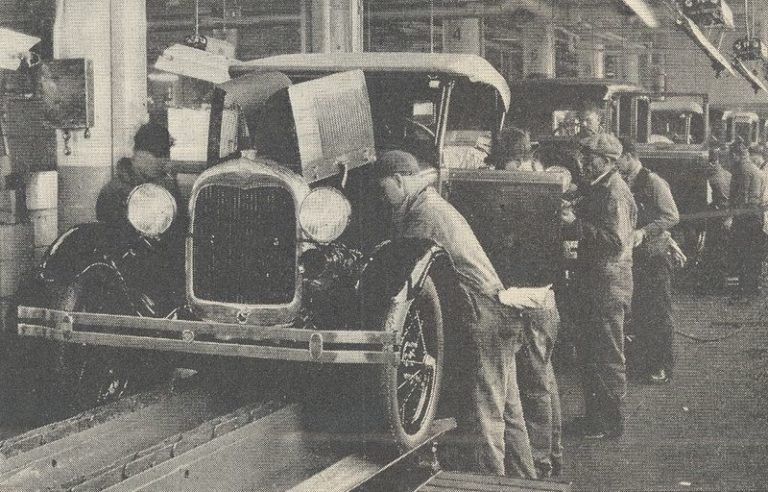This series on Great Movies for Teaching U.S. History, from the Revolutionary War to the Cold War, will publish on consecutive weekdays through May 2. It features films and documentaries inspired by historical events in the United States, including information about their educational value, ratings and appropriateness for children, and how well they represent the time periods covered.
Industrial Revolution & Roaring Twenties: 1870-1920s
After the Civil War it took time to rebuild, both emotionally and physically. However once that was done the country saw tremendous growth and change. During this time period, the country saw big progress in technology as well as pivotal legislation that changed the culture of America.
The second Industrial Revolution (1870-1914) was an era for pioneers in industry and technology. Rockefeller, Tesla, Ford, Edison, JP Morgan, and Carnegie all had their heyday within a span of just a few decades. Here is a short description for each person and some links to documentaries. PBS and American Experience has put together several documentaries on each of these men, which can be viewed online for free along with resources to learn more:
|
Nikola Tesla was an inventor, electrical engineer, and physicist. Most famous for experimenting with wireless electricity. |
Thomas Alva Edison is known for inventing the light bulb. However, his true genius was his expertise in business. |
|
Carnegie was prominent during the Civil War, but created his fortune through the steel industry. He was also a generous philanthropist. |
Henry Ford was a genius businessman who perfected the assembly line, introduced the idea of franchise, and invented the Model T, the most popular automobile of its time. |
|
John D. Rockefeller is remembered for his incredible wealth from Standard Oil. |
Teddy Roosevelt: An American Lion: 1858-1919
Teddy Roosevelt can be seen as an embodiment of America during this time. Born shortly after the Civil War, Roosevelt had health problems at a young age. As the country struggled with the aftermath of the war, he struggled with sickness. As America rallied and saw the second Industrial Revolution and expanded its territories, Roosevelt was often made to exercise by his father, and became an avid hunter and outdoorsman. He attended Harvard, joined the Navy, and became president, among several other accomplishments throughout his life.
The three-hour program goes through Roosevelt’s whole life and examines many of his accomplishments and hardships along the way, including his personal, social, and political life. The History Channel recreates certain events along the way to keep the viewer engaged. The film features interviews with family members, excerpts from his journal, and clips and images from him.
The History Channel has uploaded the entire video to YouTube, which you can view below. They have also supplied a comprehensive teacher’s guide to follow along with the program.
The industrial boom led to much prosperity through the nation and America saw great wealth during what’s commonly referred to as the Roaring Twenties. Film, music, entertainment, and travel flourished. Prohibition, the 18th Amendment outlawing alcohol, also passed during this time.
Boardwalk Empire: 1920-1925
- Rating: TV-MA
- Some seasons are available on Netflix
- Over its four seasons it has won many Golden Globes and Emmys
The critically acclaimed HBO show has been hailed for its acting and production, and the show is historically accurate.
The show begins with Prohibition and focuses on several of the politicians and gangsters who take advantage of the law. The show also features points of view from the average citizen as well as law enforcement’s struggle with upholding the law. Some characters are re-imagined to allow a more artistic viewpoint and to make the show more engaging, but there are many characters, such as Al Capone and Louis Kuehnle, whose stories remain true to what actually happened. Aside from the characters, the set and time period are accurately portrayed and the viewer can get a feel for what life was like during that time.
Prohibition: 1920-1933
- Rating: NR
- Available on Netflix
- The series was nominated for four Emmys and won one
Another film by the acclaimed Ken Burns; while it may be called ‘Prohibition,’ it’s really about the 1920s as a whole. The film centers around the law banning alcohol, but delves deeper into the root of the movement. Immigration, the Red Scare, jazz music, women’s issues, politics, and social issues are all covered in this film. In classic Ken Burns style, the man has done his research and recruited others who have done theirs. Using images, film, and documents from the actual time period, viewers get a clear story of what was happening during the time period. Historians who have studied the period are featured in the film, as well as interviews with people who were alive during the time.




































